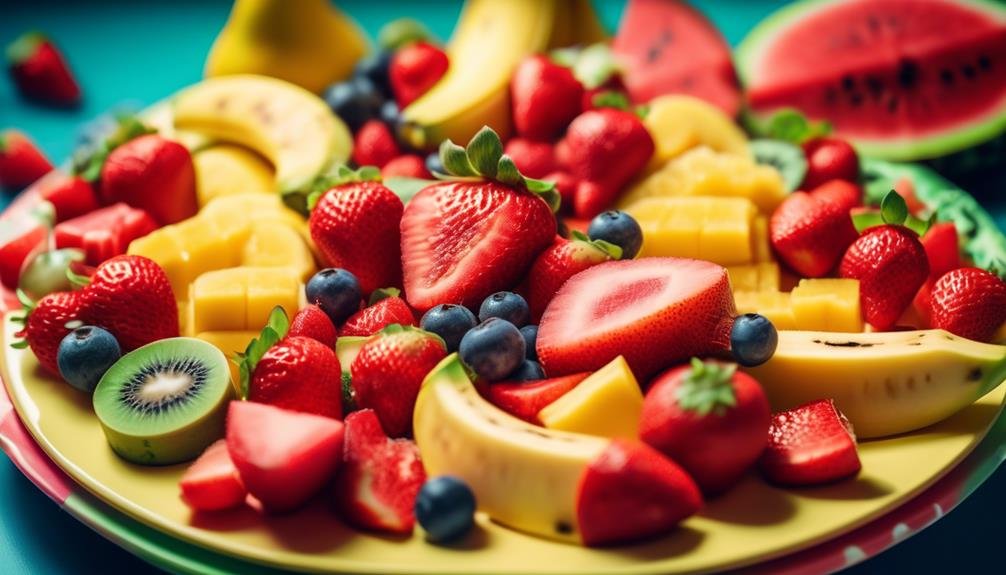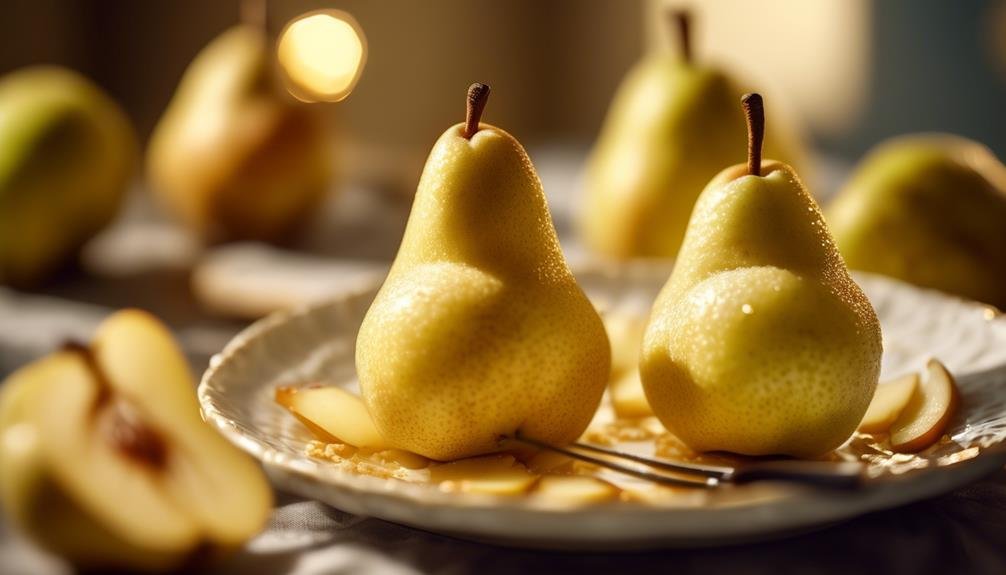"Cherishing Little Steps - A Haven for Baby and Family Journeys"
Fruits for Baby's Diet
Are you ready to embark on a journey of fruity exploration for your little one's diet? Just like a treasure chest full of colorful gems, the world of fruits offers a wide array of delicious and nutritious options for your baby.
But where to begin? Fear not, for we are here to guide you through the bountiful orchards and help you make informed choices for your little one's palate.
So, gather your curiosity and let's uncover the wonders that fruits have in store for your baby's diet.
Key Takeaways
- Fruits are essential for overall health and development, providing essential vitamins, minerals, and fiber.
- Homemade baby food allows control over ingredients and nutrients, with nutrient-rich choices like sweet potatoes, avocado, and spinach.
- Specific fruits like bananas, apples, avocados, blueberries, mangoes, peaches, pears, and watermelon offer various benefits, such as promoting digestion, brain development, immune system support, and hydration.
- Incorporating fruits into baby's diet can be done through purees, mashed fruits, adding them to yogurt or oatmeal, and gradually introducing new fruits while monitoring for allergies.
The Importance of Introducing Fruits

Introducing fruits to your baby's diet is essential for their overall health and development. The benefits of incorporating fruits into your baby's meals are numerous. Fruits are packed with essential vitamins, minerals, and fiber, which are crucial for their growth and development. They provide a natural source of sweetness without added sugars, making them a healthier alternative to processed snacks.
To incorporate fruits into your baby's meals, you can start by offering mashed or pureed fruits as a first food. Choose soft fruits like bananas, avocados, or ripe pears, which can be easily mashed or pureed to a smooth consistency. As your baby grows, you can introduce a variety of fruits, such as apples, peaches, and berries, in small, soft pieces that are easy for them to pick up and eat.
You can also mix fruits with other foods to enhance their flavor and nutritional value. For instance, you can add mashed bananas to oatmeal or mix pureed berries with plain yogurt. This not only adds variety to your baby's diet but also exposes them to different tastes and textures, promoting healthy eating habits in the long run.
Remember to introduce fruits gradually, one at a time, to monitor any potential allergic reactions. As always, consult with your pediatrician before introducing any new foods to your baby's diet.
Nutrient-Rich Choices for Your Baby
What are some nutrient-rich choices you can offer to your baby? When it comes to providing your baby with the best nutrition, homemade baby food is a great option. Not only does it allow you to control the ingredients, but it also ensures that your little one receives all the essential nutrients they need for healthy growth and development.
Introducing vegetables to your baby is an important step in their diet, as they provide a wide range of vitamins, minerals, and fiber. Here are three nutrient-rich choices you can offer to your baby:
- Sweet potatoes: Packed with beta-carotene, sweet potatoes aren't only delicious but also great for your baby's vision and immune system.
- Avocado: This creamy fruit is high in healthy fats and contains essential nutrients like vitamin E and potassium, which are important for brain development.
- Spinach: Rich in iron and folate, spinach is a fantastic choice for your baby's growing body. It can help support their blood production and overall health.
These nutrient-rich choices aren't only beneficial for your baby's health but also help establish healthy eating habits from an early age. By introducing vegetables like sweet potatoes, avocado, and spinach into their diet, you're setting them up for a lifetime of good nutrition.
Banana: A Perfect First Fruit

When it comes to introducing your baby to their first fruit, look no further than the banana – a perfect choice for their developing taste buds and nutritional needs.
Bananas aren't only delicious, but they also offer numerous benefits for your baby's development. Bananas are packed with essential nutrients that are vital for your baby's growth. They're a great source of potassium, which helps in maintaining healthy blood pressure levels. Bananas also contain fiber, which aids in digestion and promotes a healthy gut. Additionally, they're rich in vitamin C, which supports a strong immune system, and vitamin B6, which is important for brain development.
To introduce bananas to your baby's diet, start by mashing them into a smooth puree. As your baby grows, you can gradually increase the texture to small, soft pieces that they can easily chew. Remember to always choose ripe bananas, as they're easier to digest and have a sweeter taste.
When serving bananas to your baby, it's important to practice safe feeding techniques. Make sure to cut the fruit into small, bite-sized pieces to avoid choking hazards. As with any new food, it's recommended to introduce bananas one at a time and wait a few days before trying another new food. This allows you to monitor your baby for any potential allergic reactions.
Apple: Crunchy and Nutritious
Apples are a crunchy and nutritious fruit that you can introduce to your baby's diet. Here are three reasons why you should consider adding apples to your little one's meals:
- Rich in essential nutrients: Apples are packed with vitamins and minerals that are vital for your baby's growth and development. They contain vitamin C, which helps boost the immune system, and dietary fiber, which promotes healthy digestion.
- Promotes oral health: The natural crunchiness of apples can help stimulate your baby's gums and promote good oral health. Chewing on apple slices can also help strengthen jaw muscles, preparing them for solid foods.
- Versatile for recipes: Apples are incredibly versatile and can be incorporated into a variety of recipes for your baby. From homemade applesauce to baked apple slices, there are endless possibilities to introduce this nutritious fruit to your little one's meals.
When introducing apples to your baby, it's important to choose ripe, organic apples and always peel and core them before serving. Remember to cut them into small, baby-friendly pieces to avoid any choking hazards.
Including apples in your baby's diet can provide them with a range of health benefits while introducing them to new flavors and textures. So why not try some delicious apple recipes and give your baby a healthy and tasty treat?
Avocado: Creamy Goodness for Baby

Did you know that avocados can be a creamy and nutritious addition to your baby's diet? Avocados aren't only delicious, but they're also packed with essential nutrients that can support your baby's growth and development.
When it comes to introducing new textures to your baby, avocados are a great choice. Their smooth and creamy consistency makes them easy for your little one to swallow and digest. This can help prevent any potential choking hazards and make mealtime a more enjoyable experience for both of you.
Avocados are also known for their mild flavor, which is perfect for your baby's developing taste preferences. They have a subtle taste that isn't overpowering, allowing your little one to explore new flavors without being overwhelmed.
Furthermore, avocados are a good source of healthy fats, which are essential for your baby's brain development. These healthy fats also help in the absorption of fat-soluble vitamins, such as vitamins A, D, E, and K, which are crucial for your baby's overall health and well-being.
To introduce avocados to your baby, you can simply mash a ripe avocado and serve it as a puree or spread it on a piece of toast. You can also mix it with other fruits or vegetables to create a more exciting and nutritious meal. Just make sure to choose a ripe avocado that's soft to the touch and has a creamy texture.
Blueberries: Tiny Powerhouses of Antioxidants
Avocados may be a creamy and nutritious addition to your baby's diet, but now let's talk about another powerhouse fruit that's packed with antioxidants: blueberries. These tiny berries aren't just delicious, but they also offer incredible health benefits for your little one.
Here are three reasons why blueberries should be a part of your baby's diet:
- Antioxidant Benefits: Blueberries are known for their high antioxidant content, which helps protect your baby's body against damage caused by harmful free radicals. These antioxidants, such as vitamin C and vitamin E, play a crucial role in boosting your baby's immune system and promoting overall health.
- Nutritional Value: Blueberries are a nutritional powerhouse, packed with essential vitamins and minerals. They're an excellent source of vitamin K, manganese, and fiber, which are all important for your baby's growth and development. Additionally, blueberries are low in calories and fat, making them a healthy snack option for your little one.
- Brain Development: Blueberries are often referred to as 'brain berries' due to their potential benefits for brain health. They contain compounds called flavonoids, which have been linked to improved cognitive function and memory. Including blueberries in your baby's diet may support their brain development and enhance their learning abilities.
Incorporating blueberries into your baby's diet can provide them with antioxidant benefits, nutritional value, and promote healthy brain development. So go ahead and introduce this delicious and nutritious fruit to your little one's meals and snacks. They'll surely enjoy the burst of flavor and reap the numerous health benefits blueberries have to offer.
Mango: Sweet and Tropical Delight

Mangoes, with their sweet and tropical flavor, aren't only a delicious treat but also a nutritious addition to your baby's diet. These luscious fruits are packed with essential vitamins and minerals that support your little one's growth and development.
When it comes to introducing mangoes to your baby, it's important to choose ripe fruit that's soft to the touch. You can puree mangoes to create a smooth texture that's easy for your baby to eat. Alternatively, you can cut the mango into small, bite-sized pieces for your little one to enjoy as finger food. The natural sweetness of mangoes makes them an instant hit with most babies.
In addition to their irresistible taste, mangoes offer numerous health benefits. They're a great source of vitamin C, which helps boost your baby's immune system. Mangoes also contain dietary fiber, promoting healthy digestion. Furthermore, they're rich in antioxidants, which protect the body against free radicals and support overall well-being.
To incorporate mangoes into your baby's diet, you can try making homemade mango puree or adding small chunks of mango to yogurt or oatmeal. The possibilities are endless! Just make sure to introduce mangoes gradually and watch for any signs of allergy or intolerance.
Peach: Juicy and Full of Vitamin C
When it comes to introducing new fruits into your baby's diet, the next delicious and vitamin-packed option to consider is the juicy and vitamin C-rich peach. This fuzzy fruit not only tastes great but also provides numerous health benefits for your little one. Here are some reasons why you should include peaches in your baby's diet:
- Boosts Immune System: Peaches are bursting with vitamin C, which helps strengthen your baby's immune system, protecting them from common illnesses.
- Aids Digestion: Peaches are rich in dietary fiber, which promotes healthy digestion and prevents constipation in your baby.
- Supports Healthy Growth: Peaches are packed with essential nutrients like potassium and vitamin A, which are crucial for your baby's growth and development.
To incorporate peaches into your baby's diet, here are a few simple and nutritious recipes:
- Peach Puree: Steam or boil peeled and pitted peaches until soft. Then, blend them until smooth. You can serve it on its own or mix it with other fruits for added flavors.
- Peach Yogurt: Mix mashed peaches with plain yogurt to create a creamy and nutritious treat for your baby.
- Peach Oatmeal: Cook oats according to the package instructions and stir in mashed peaches for a delicious and wholesome breakfast option.
Remember to introduce one new fruit at a time and monitor your baby for any allergic reactions. Enjoy exploring the wonderful world of peaches with your little one!
Pear: A Gentle and Digestive-Friendly Option

Pears are a gentle and digestive-friendly option to introduce into your baby's fruit diet. They aren't only delicious but also packed with essential nutrients. Pears are known for their high dietary fiber content, which aids in gentle digestion for your little one. The fiber in pears helps regulate bowel movements, preventing constipation and promoting a healthy digestive system.
Introducing pears into your baby's diet can have many benefits. The gentle nature of pears makes them easy to digest, reducing the risk of stomach discomfort or digestive issues. The dietary fiber in pears can also help prevent colic and other digestive problems that babies may experience.
When selecting pears for your baby, choose ones that are ripe but still firm. This ensures the fruit is easy to handle and minimizes the risk of choking. You can peel and puree the pear to make a smooth and creamy texture for your baby, or you can offer small, soft pieces for them to self-feed if they're ready for solids.
Remember to always consult with your pediatrician before introducing any new food into your baby's diet. They can provide guidance on when and how to introduce pears and other fruits to ensure a safe and balanced diet for your little one.
Watermelon: Hydrating and Refreshing for Baby
Watermelon is a hydrating and refreshing option to incorporate into your baby's fruit diet. Here are three reasons why watermelon is beneficial for your little one:
- Hydrating benefits: Watermelon is made up of about 92% water, making it an excellent choice for keeping your baby hydrated. Proper hydration is crucial for their overall health and well-being, especially during hot summer months or when they're unwell.
- Nutritional value: Watermelon isn't only hydrating but also packed with essential nutrients. It contains vitamins A and C, which support your baby's immune system and promote healthy growth and development. Additionally, watermelon is a good source of potassium, which aids in maintaining proper heart and muscle function.
- Texture and taste: Watermelon has a soft and juicy texture that's easily palatable for your baby. Its naturally sweet taste makes it appealing to their developing taste buds. Introducing your little one to different textures and flavors at an early age can help expand their palate and encourage healthy eating habits.
Incorporating watermelon into your baby's fruit diet can provide hydration, essential nutrients, and a delightful taste experience. Remember to introduce new foods gradually and consult with your pediatrician for any concerns or allergies.
Frequently Asked Questions
Can I Give My Baby Fruit Before They Start Eating Solid Foods?
You can give your baby fruit before they start eating solid foods. Introducing fruits to babies is best done through fruit purees, which are easy to digest and packed with nutrients.
How Should I Introduce Fruits Into My Baby's Diet?
When introducing fruits into your baby's diet, start with mashed or pureed options. Gradually increase texture and variety. Offer a range of fruits to encourage enjoyment. Remember, it's important to wait until your baby is developmentally ready for solid foods.
What Are Some Alternative Fruits to Consider if My Baby Has Allergies?
Consider alternative fruits for your baby if they have allergies. These options provide nutritional benefits and are safe to introduce into their diet.
Are There Any Fruits That I Should Avoid Giving to My Baby?
You should avoid giving certain fruits to your baby. Some fruits can pose risks when introduced to their diet. It's important to be aware of which fruits to avoid to ensure your baby's safety and well-being.
How Much Fruit Should I Give My Baby Each Day?
You should give your baby fruit servings based on their age. Including fruits in your baby's diet has numerous benefits, such as providing essential vitamins and minerals for their growth and development.
Conclusion
In conclusion, introducing fruits into your baby's diet is crucial for their overall health and development. Not only are fruits nutrient-rich, but they also provide a variety of essential vitamins and minerals.
Did you know that according to a study published in the Journal of Pediatrics, children who consume a diet rich in fruits have a lower risk of developing chronic diseases later in life?
So start offering your little one a wide range of fruits to support their long-term health.



I like this blog it’s a master piece! Glad I detected this ohttps://69v.topn google.Raise blog range